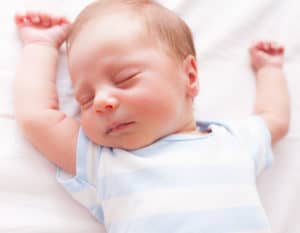REM and NREM lengths – This is an important factor to understand, because adults and babies sleep patterns differ. Let’s break down how infants and adults sleep differently. Adults cycle through sleep stages with both REM (Rapid eye movements) and NREM (Non-rapid eye movement. Adults spend about 20-25 minutes a night in REM sleep with our sleep cycles being about 90-120 minutes. Our babies however are more evenly divided between REM and NREM sleep as well as their sleep cycles are only lasting around 50 minutes for the first 9 months of life.
Brain Development – REM is the active part of sleep, this is when our brains are releasing seratonin, we are also processing events of the day and formulating our memories.
Waking in the Night – Although adults may sleep straight through the night, we still cycle and have periods of deep and lighter sleep transitioning from one to another often without consciously awakening. A child however due to the more frequent short cycles will often fully awake between these cycles. The goal would be for your baby to be able to put themselves back to sleep between these cycles. Infants are more likely to awaken easily during the REM stages as opposed the the NREM stages of sleep. You may have noticed with a young infant, once they are well asleep they could sleep through a loud rock concert and nothing will awaken them! On the other hand, if you’re baby has just fallen asleep, they are often easily aroused.
The good news! – As your baby grows, their sleep patterns become more like adult sleep cycles, less time is spent in REM sleep and the actual sleep cycles lengthen. By the time your child is of school age their sleep patterns are much more similar to ours.
Conclusion – We know infants sleep between 10-18 hours in a 24 hour period. By the time your baby is 3 months of age he is sleeping between 9-12 hours per 24 hour period (including naps). Adults are sleeping an average of less than 7 hours per night in the average household. As you can see, adults and infants/children have different sleep needs and although their are some similarites and differences to these patterns, it’s helpful to understand how we sleep differently.

Credit –https://www.sleepfoundation.org